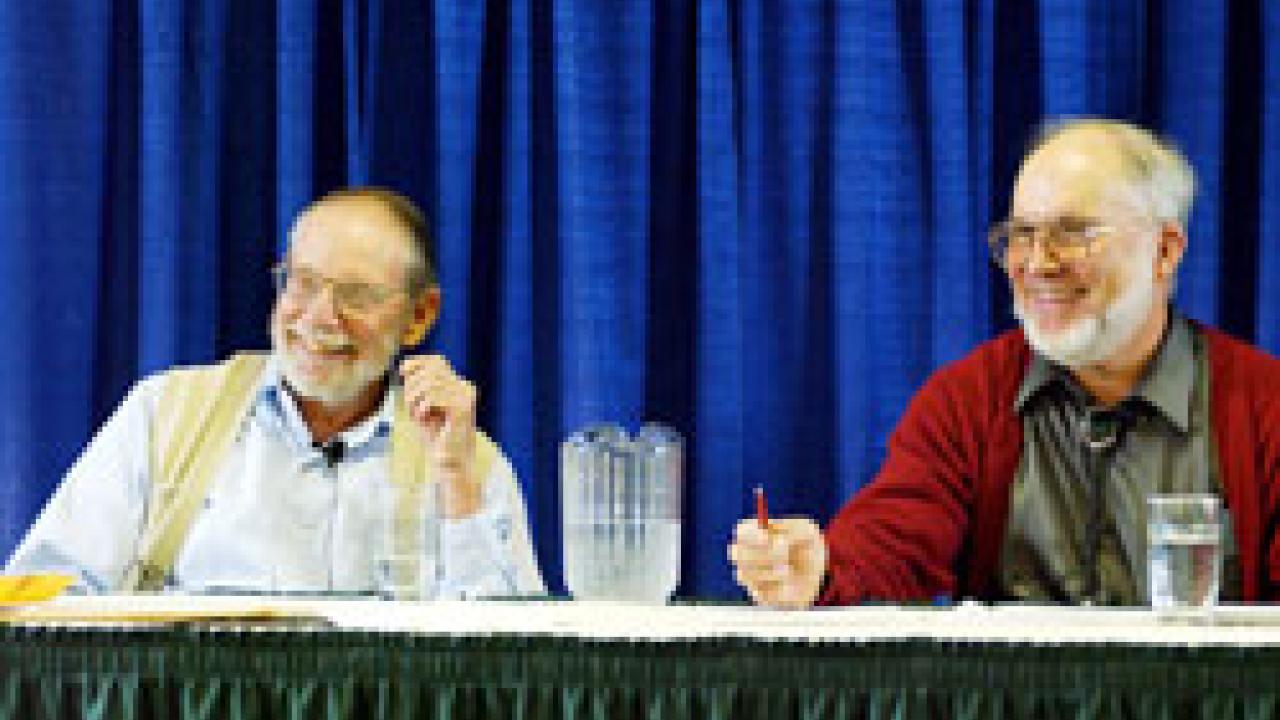Mention the phrase "literary non-fiction" in a conversation and John McPhee's name will almost certainly come up.
McPhee, the longtime New Yorker staff writer and Pulitzer Prize-winning author, spent much of the '80s and '90s writing about a highly specialized subject -- geology.
In his literary excavations of the natural world, McPhee relied on Eldridge Moores, a UC Davis geologist known worldwide for his theory of plate tectonics. The result was McPhee's best-seller Assembling California (1993), in which Moores was a central figure.
McPhee gave four public appearances on campus Nov. 10-13, including a public conversation Nov. 12 between himself and Moores. More than 300 people crowded into the University Club for the noontime discussion, which also included Jack Hicks, a senior lecturer in the English department who moderated the event.
Moores recalled the day in 1978 when McPhee arrived in Davis in a rented pickup. After McPhee sat through one of Moores' geology classes, the two jumped in the truck and headed toward the Nevada state line, then headed back west, stopping at intriguing geological sites along the way. It was the right formula for a book -- scientist and writer, working together, one explaining deep science, one polishing the prose.
In his other work, McPhee, 72, has taken readers inside the world of art museums, environmental groups, fruit markets, airship factories, basketball courts and atomic-bomb labs.
McPhee, who still teaches at Princeton University and lives in New Jersey, said writing about geology is a "mind-fracturing behavior, masochistic, self-enslaved labor." And the American West is a terrific setting due to its diverse geology. "The far out stuff is out in the far west of the country."
In Assembling California, which took 25 years to complete, McPhee takes readers on an intensive geological tour from the Sierra Nevada through wine country to the San Andreas fault system, a 50-mile-wide swath of parallel fault lines. Through talks with Moores, McPhee introduces the reader to current geological controversies, and surveys global plate tectonics -- the collision and rearrangement of land masses ever since the breakup of the supercontinent of Pangaea eons ago. And he examines earthquake prediction and the 1989 San Francisco quake.
Through the years the two clocked countless miles, far and wide. "We went to Cyprus, Macedonia," McPhee said, pausing, "and even Winters."
Moores, who arrived at UC Davis in 1966 and retired last year, acknowledged that the book gained him wide recognition for his geological theories.
"I started getting calls from people who were non-geologists," he said.
The collaboration was the key to the success of the project, both said. "We worked back-and-forth on the manuscript for many years," said Moores.
For his part, McPhee welcomes input from his scientific sources and said he made extensive use of fact-checkers at The New Yorker. "I've always shown manuscripts to the scientists I'm working with. What a privilege it was to learn from someone like Eldridge."
In their process of collaboration, Moores and McPhee became lifelong friends, and McPhee actually penned more books on geology -- the Annals of the Former World, which collects four of his geology books together, won a Pulitzer Prize in 1999. According to the April 19, 1999, issue of the Princeton Weekly Bulletin, when McPhee was informed that he had won the prize, he said calmly, "It's pretty nice.'"
Beyond the writing life, McPhee suggests appreciating the natural world and not taking it for granted. "It's just plain interesting."
As Moores put it, "John McPhee says, 'What other planet are you going to live on?' You've got to know something about your home."
Moores advocates the study of geology for students in secondary school. "It's a crying shame that geology is not a required course. It's something that everyone should know about."
Later that day, McPhee joined writers UC Davis Professor Emeritus Gary Snyder and former U.S. Poet Laureate Robert Hass of UC Berkeley in discussing "Writing Nature in the 21st Century."
Web-casts from the visit — which was made possible by the Snyder/Soderquist Distinguished Visiting Writers Series, established in 2002 — are online at http://www.news.ucdavis.edu/.
